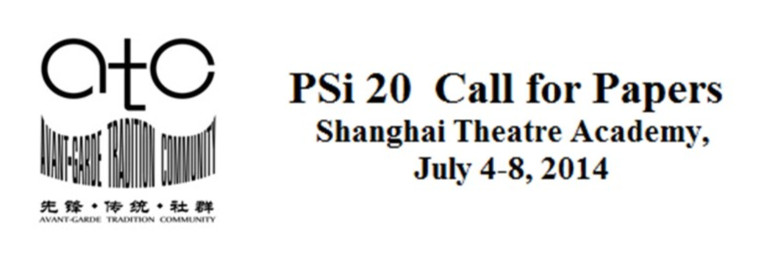
http://psi20.sta.edu.cn
PSi20 will focus on the contrasting and intertwined themes of “Avant-garde, Tradition, Community.” These themes have diverse relationships to performance and underpin interweaving histories of arts and other performative actions alongside the development of performance studies. They are parallel, intercultural and co-located terms that have crossed borders wherein relationships between arts and cultures are renegotiated and transformed.
At this second Psi conference in Asia and the first hosted by an Asian university, we aim to examine these terms in the Asian context and wider cultural-historical geographical contexts. Notions of the avant-garde, of tradition and of community, while broadly relevant in global performance studies, have unique and enduring connections to Asian performance and modernity. PSi 20 will investigate the history surrounding and informing these themes in performance studies.
Each of these influential terms is expressive of contestation and paradox. The term Avant-garde fosters notions of innovation and rebellion for performance practitioners and scholars in the West, and has obtained strong Chinese characteristics since the late 1970s. In broader Asian contexts while its meanings are debated, it has been the harbinger of modernity and interculturalism.
Tradition is often contrasted to the avant-garde (although historical avant-gardes have traditional aspects). Tradition is a diverse concept that connects to modern realism and performances that arise in local community and indigenous contexts. In Asian societies, traditional performance genres include Chinese opera, Noh, Kathakali and Wayang, which have often been utilized, de-contextualized and deconstructed, by Western avant-garde artists. This in turn has inspired a trend among Asian and other non-western artists to engage in processes of “rediscovering” and translating their own cultural traditions. Various avant-garde approaches to traditions have stimulated a great deal of intercultural and cosmopolitical debates. Scholars have also paid attention to ideas of invented traditions and the role of traditional performance in the formation of non-western modernities. The ways that notions of the avant-garde and of tradition are closely connected in Asia and elsewhere is a key question that we highlight for consideration.
Our focus on Community refers to grassroots, nonprofessional artistic, neighbourhoods where pre-modern traditions, modern traditions, and the avant-garde may converge.
While a focus on Asian expressions of these themes is highlighted, Psi 20 welcomes papers, panels, workshops, and performances exploring many issues related to the three key words in various cultural and intercultural contexts. We invite consideration of these themes in comparative and intercultural studies, studies across western and non-western sites and in relation to globalization, modernity, and contemporaneity. Avant-garde, Tradition and Community are positioned here as umbrella terms.
We invite proposals on a range of thematic topics that may include:
• How are notions of the avant-garde, tradition and community linked within a larger global understanding of performance and performance studies?
• How do these themes relate to perceptions and practices of performance in different places and cultures?
• How are notions of the avant-garde and tradition understood, theorised, practiced and debated where you are?
• How do Asian and other non-western praxis relate to discourses and experiences of performance in the broadly defined sphere of Western avant-garde praxis?
• How is the avant-garde associated with traditional performance? Opposed, derivative, parallel, with blurred edges?
• How are the terms avant-garde, tradition and community defined in the 21 century? In local, regional and global contexts?
• How do notions and/or expressions of cultural difference influence our perceptions and experience of these terms? What are the border crossings and blockades to an intercultural understanding of these terms, in the wake of globalization?
• How meaningful are the terms in the context of cultural, geographical, and historical boundaries? Do we need new terms and formations?
• Does performance studies in your institution involve artists off campus? Does it involve non-academic, non-artistic communities?
• How do performing/performance artists view non-artistic communities - consumers, beneficiaries, participants, or/and collaborators?
• What are the relations between aesthetic performance studies and social performance studies?
Submissions: papers, panels, roundtables, praxis sessions, performances
Paper, panel & roundtable proposals: 200-word abstracts for paper proposals. 500-word abstracts for panel submissions. Please include names of all participants, institutions, A/V requests.
Praxis session proposals: This term refers to a conference slot designed for interaction between artistic work and scholarship. The form is open - workshops, dialogues, performance lectures, participatory events etc. Each Praxis session proposal must have a curator or convener. Initial proposal: 400-word abstract indicating space, equipment and time requirements; estimated number of participants; and name(s) and affiliation(s) of the proposer(s).
Performance proposals: While we are planning several local performances based on the themes of the conference, artist/scholars can also propose self-contained performances as part of the conference, especially related to the scholarly discussions of the conference. Initial Proposal: 400-word description of the piece, DVD and technical requirements.
For all submissions: At the top of your document state your name, contact info, and affiliation. Attach your proposal as a PDF or Word Document. Include your last name in the file name of the document.
Please send your inquiries to: psi20@sta.edu.cn
Deadline for proposals: NOVEMBER 20, 2013, midnight (Beijing Time)
Send your proposals to: psi20@sta.edu.cn



